The food industry remains one of the biggest business sectors in the world, with a current market size of $2.3 billion projected to grow to a whopping $5.1 billion by 2029. Despite its enormity, operational problems persist even in leading restaurant chains—such as inventory wastage, demand forecasting, supplier management, and employee management.
To address these challenges, businesses are increasingly turning to AI-driven solutions. From AI phone systems and voice assistants to advanced restaurant technology like kiosks and drive-thru innovations, AI is transforming the way restaurants operate. For instance, tools like Winnow and Opencity are helping restaurants streamline back-of-house operations and manage labor shortages effectively. In the front-of-house, AI phone answering systems and chatbots like ChatGPT are enhancing customer experience by providing quick and efficient service.
How can AI be used in a restaurant?
When people hear about AI in the restaurant business, they might immediately think of robots creating and serving meals. While this is true for some restaurants, the most significant use of AI technology is in backend operations. A recent Forrester survey reported that 69% of companies are enjoying reduced operational costs through AI, with the fast-food industry being the biggest user of these innovations.
Here are some ways the food and restaurant industry utilizes artificial intelligence and machine learning technology:
a. AI phone systems and voice assistants
An average-sized restaurant with 25 tables typically needs around 5-6 front staff to ensure efficiency. This can be dramatically reduced with the use of AI phone systems and conversational AI. These tools can handle tasks such as booking tables, adding guests to waitlists, ordering meals, and answering basic questions. AI voice assistants are particularly effective in this regard.
b. Voice commands
Recent surveys suggest that 53% of people prefer searching for restaurants and menus using voice commands, while 49% use voice search to find information about specific restaurants. These figures highlight the growing comfort consumers have with voice commands. Integrating AI voice solutions in drive-thrus and self-service kiosks has been shown to reduce order errors by up to 90%. This boosts operational efficiency, leading to higher customer retention and conversion rates.
c. Inventory management with AI tools
Restaurants often face the challenge of food wastage, with an average of 10% of food wasted before reaching the customer's plate. By using AI tools for inventory management, including AI-powered solutions like Winnow and Opencity, restaurant operators can streamline their inventory and supply management. AI-integrated point-of-sale (POS) systems help track inventory purchase data, limit waste, and control food costs effectively.
d. Accurate data-based insights
One of the best uses of artificial intelligence and machine learning in the food industry is generating accurate data-based insights. These insights help restaurants predict consumer behavior, optimize sales strategies, and adjust staffing levels based on market trends. This technology enhances a restaurant's competitiveness while reducing unnecessary inventory and labor costs.
e. Online review management
A recent study by Tripadvisor revealed that 94% of people read responses to reviews when choosing a new restaurant. Well-crafted responses, often generated with the help of AI tools like ChatGPT, can encourage potential customers to visit despite negative reviews. Additionally, 58% of consumers are willing to pay more to support companies with good reviews, highlighting the importance of managing online reputation.
Click here to learn more about how online reputation can boost your business.
How is AI impacting the restaurant industry?
AI technology is revolutionizing the restaurant business by ensuring a more efficient management process. Restaurant owners and restaurateurs are increasingly adopting AI tools to streamline operations, allowing staff to focus more on delivering exceptional food and customer service. Here are some of the key benefits enjoyed by restaurants using AI:
a. Cut costs
AI technologies enable restaurant owners to automate routine and simple tasks, significantly reducing labor costs. For example, using AI for demand forecasting helps restaurants like McDonald's and Chipotle manage their stocks efficiently, avoiding food wastage and logistic costs. AI tools, such as those offered by Winnow, assist in precise inventory management, which helps in cutting down unnecessary expenses.
b. Reduce errors
Human error is a common issue in the restaurant industry. A server in a busy dining room might mishear orders, leading to incorrect dishes being prepared. This recurring error can result in substantial financial losses. By empowering restaurant staff with AI technology and advanced POS systems, errors can be minimized. AI-driven solutions enhance accuracy, allowing staff to focus on handling more orders and boosting revenue.
c. Customize orders
Upselling through relevant consumer data is a lucrative strategy in the restaurant business. AI tools allow for customizable ordering options, increasing conversion rates. In fact, a recent survey by the National Restaurant Association showed that 72% of consumers expect customization in their orders. AI technology helps create dynamic menus based on customer history and behavior, ensuring that guests get precisely what they want while allowing restaurants to effectively upsell.
d. Improve guest service
While AI technology cannot fully replicate the human touch, it can handle routine tasks, freeing up staff to focus on more critical aspects of guest service. By using AI to manage tasks at the drive-thru and self-service kiosks, employees can concentrate on delivering exceptional customer experiences. This approach reduces employee burnout, which has risen by 52% in the food service industry. High employee retention is crucial as each hiring process incurs costs that could otherwise be directed towards revenue-generating activities.
e. Find new customers
With 74% of people preferring to order food online, having a strong online presence is essential. AI-powered review management tools, such as those utilizing ChatGPT, help restaurants like White Castle and Domino’s build strong online credibility through customer reviews. Additionally, AI technology enhances SEO and content creation, boosting visibility on search engines and attracting new customers.
To learn more about review management tools, click here.
What is the risk of AI in the food industry?
Despite the powerful benefits of AI, there are risks associated with its misuse. If not implemented correctly, AI in the restaurant business can lead to customer dissatisfaction, privacy issues, environmental concerns, and health problems. Restaurant owners must ensure that AI technologies are used responsibly and effectively to mitigate these risks and maximize their advantages.
12 AI tools every restaurant manager should know
To help you understand how AI is used within the restaurant industry today, here are the top AI tools every restaurant manager should know.
- MARA AI- Review reply generator for reputation management.
- VOICEplug AI - Interactive and conversational ordering solution for restaurants.
- Winnow Vision - Food waste management technology for restaurants and hotels.
- Greet - AI-powered virtual receptionist utilizing natural language use.
- Flippy 2 and FlippyLite - AI and ML-powered kitchen robots for frying.
- CookRight - AI-powered camera system for brewing coffee.
- Cecilia AI - World's first interactive AI bartender.
- Wobot AI - Video Intelligence Solution (VMS) to integrate operational insights into security cameras.
- Ingest AI - Real-time data integration solution for restaurants.
- Zira AI - Workforce management platform creating AI-generated employee schedules.
- UEAT - Dynamic menu generation based on customer data.
- Tidio - Chatbot and live chat solutions for restaurants.
1. MARA AI
MARA AI review reply assistant allows restaurant managers to respond to every customer review with personalized responses within seconds. Restaurants can now veer away from using a common business reply template, as MARA AI is specifically set to meet industry-specific metrics. Instead of saying a generic "thank you" message, you can easily generate replies that would reinforce a reviewer's note on your food's quality and exceptional customer service.
By achieving a 100% response rate and 3x faster response time, a restaurant can easily build a strong online reputation and create impressive customer engagement. This will not just help restaurant operators get loyal customers and attract new ones.
Click here to learn more about the importance of review replies.

2. VOICEplug AI
VOICEplug AI enables restaurants to offer an interactive and conversational ordering experience. The solution is integrated with your restaurant's phone system, call center, drive-thru, and ordering system, allowing your POS to accept natural voice conversations and commands.
They first identify the website, apps, and systems that need to be voice-enabled, run their AI algorithms to seamlessly integrate it with their apps, content, and transaction flows, and deploy dialog flows. VOICEplug AI reported a 90% reduction in customer abandonment rate and lost orders and a 75% reduction in per-order costs among its users.

3. Winnow Vision
Winnow Vision is a food waste management technology that helps restaurants save time and money. Enabled with AI to maximize operational efficiency and data accuracy, Winnow Vision is helping hundreds of kitchens across the globe cut their production costs by up to 8% a year.
As of this writing, IKEA UK is one of Winnow Vision's biggest partners. The company reported €1.4 million in cost savings, 800,000 meals saved, and food waste cut across all stores by 37%.

4. Greet
Bensen AI's Greet provides an AI-powered virtual receptionist for businesses. Greet understands human voice and natural language use, matching it with automated workflows to transmit orders accurately.
Restaurants using Greet see a 50% reduction in phone interruptions and a 30% boost in online ordering. According to Anthony, a Chick-fil-A Franchise Owner, their restaurant received more than 100 calls per day which their staff needed to accommodate simultaneously. With Greet, they only have to attend to less than half of the daily calls as most orders are now directed by Greet to their POS.

5. Flippy 2 and FlippyLite
Flippy 2 and Flippy Lite are both reiterations of Miso Robotics' flagship AI product. Both robots help kitchen staff fry nearly anything, with Flippy 2 focusing on large-scale frying while Flippy Lite is made for single-serve orders.
The technologies feature AutoBins, which uses AI vision to automatically recognize food, transfer them to its cooking slot, and fry the food to perfection with less human interaction possible. This creates 2x faster food preparation time and 30% more fried food production to meet customer expectations.

6. CookRight
Another Miso Robotics technology, CookRight Coffee, is an AI-powered system that monitors key metrics in creating coffee–volume, temperature, and time data. The system uses AI-powered cameras to monitor the brewing process and uses ML to identify items used automatically.
Panera Bread uses the CookRight technology for its Unlimited Sip Club Membership, allowing customers to drink unlimited coffee and tea each visit. According to George Handson, SVP and Chief Digital Officer of Panera, CookRight Coffee is a game changer regarding convenience and operational efficiency.

7. Cecilia AI
Cecilia AI is the world's first interactive bartender that can be customized for every business and event. Powered by conversational AI and voice recognition abilities, Cecilia makes cocktails crafted by acclaimed mixologists, chats with customers, and even promotes your brand to your visitor.
Cecilia AI is currently promoted for use in hotels, airports, VIP lounges, casinos, cruise ships, and offices, as high-volume nightclubs and bars might interfere with its voice recognition abilities. Despite this, AI is constantly updated with new cocktails and mixes to serve customers.

8. Wobot AI
Wobot AI uses a video intelligence solution (VMS) to derive operational insights through your existing security cameras. To put simply, Wobot adds "brains" to businesses' camera systems, enabling them to track restaurant operations processes, automate service flows, monitor employee productivity, manage tickets or incidents, and more.
According to Wobot AI's recent survey, video intelligence allows businesses to ensure crucial food management tasks such as inventory management, staff hygiene, and food preparation. This ensures optimal food quality and service efficiency by up to 72%.

9. Ingest AI
Ingest AI creates smart restaurants, allowing brands to fully integrate data on various areas of businesses. This includes revenue management, time and attendance monitoring, automated scheduling, COGS and purchasing, and reservation processes.
In an interview with WIRED, Kenneth Kuo, CEO of Ingest AI, claims that their algorithm can predict what is happening within any restaurant with 95% certainty. This allows restaurants using Ingest AI to better determine their staffing and materials needs and cut costs.

10. Zira AI
Zira AI is a workforce management platform that helps restaurants automate employee scheduling, including time and attendance management and payroll tracking. Zira creates dynamic schedules based on real-time employee preference, availability, and operation data, enabling restaurants to have the most optimal employee schedule with higher retention and work satisfaction.
Zira AI reports 30+ hours saved a week in scheduling, a 41% increase in employee retention, and an 18% labor cost savings from their partners across the globe. Furthermore, one of its prominent partners Chicken as Cluck reported 100% employee show rates and 95% employee on-time rates upon utilizing Zira AI scheduling solution.

11. UEAT
UEAT's RAI is a smart recommendation module based on artificial intelligence that creates personalized customer experiences. This allows restaurants to achieve higher conversion rates by creating relevant dynamic menus and upselling products based on customer data.
Cooper Branch, a 100% plant-based fast-casual restaurant, reported a 26% growth in year-over-year sales across all locations and a 10% increase in ticket size through UEAT's dynamic menus. Other partners that have experienced a significant boost in sales through UEAT are Normandin, Sushibox, Mandy's, and Five Guys.

12. Tidio
Tidio offers chatbot and live chat solutions for businesses. Their AI software suggests menu items, makes reservations, takes orders, and provides exceptional customer service to increase a restaurant's conversion rate.
Aside from all these automation processes, Tidio also emphasizes the importance of customer feedback collection, as 87% of customers look at online reviews before buying from a brand. They have a feedback chatbot that automatically reminds customers to leave reviews on third-party restaurant review websites such as Yelp, Tripadvisor, and Google My Business.
To learn more about the importance of online reviews in restaurants, click here.

Restaurants powered by AI are dominating the market.
From inventory management and food preparation to customer service, AI is revolutionizing the restaurant industry. The integration of artificial intelligence and advanced restaurant technology is reshaping how restaurants operate. Despite some skepticism, AI companies emphasize that their solutions are designed to enhance efficiency and support restaurant professionals rather than replace them.
AI is not here to replace you—using AI is here to empower you. A restaurant manager who leverages AI tools will have a competitive edge. AI solutions are pivotal in addressing labor shortages, minimizing food waste, reducing operational errors, and mitigating employee burnout. With AI, restaurant owners can streamline phone answering processes, optimize POS systems, and enhance the overall customer experience.
For instance, major chains like McDonald’s, Chipotle, and Domino’s are already harnessing AI to improve their operations. AI-driven technology helps these giants manage inventory more efficiently and deliver consistent service. Similarly, companies like Del Taco and White Castle are integrating machine learning and AI tools to enhance food preparation and customer interactions.
Incorporating AI into your restaurant’s technology stack aligns with the insights from the National Restaurant Association, which highlights the growing importance of technology in maintaining competitive advantage. By adopting AI solutions, restaurant managers can ensure delicious food with reduced waste and operational errors, ultimately leading to improved customer satisfaction and operational efficiency.
Hassle-free review management with MARA AI
Responding to online reviews for your restaurant can be a daunting task, but it doesn't have to be with our AI Review Assistant, MARA. This intuitive tool is designed to ease your Online Reputation Management process, making it more efficient, personalized, and time-saving. It offers the best and most personalized AI for responding to and analyzing your guest reviews.
User-friendly Review Inbox
One of the key features of this tool is the Review Inbox. Your review inbox makes responding to reviews as simple as hitting "Generate reply" and clicking "Send". The Review Inbox connects to multiple review sources, including Google, Yelp, and OpenTable, giving you a panoramic view of all your reviews. And you can even configure review response automation: Why not allow MARA to automatically respond to simple reviews, like 5-star Google reviews with no text, ensuring you never miss a review? Daily notifications about new reviews keep you updated and in control.
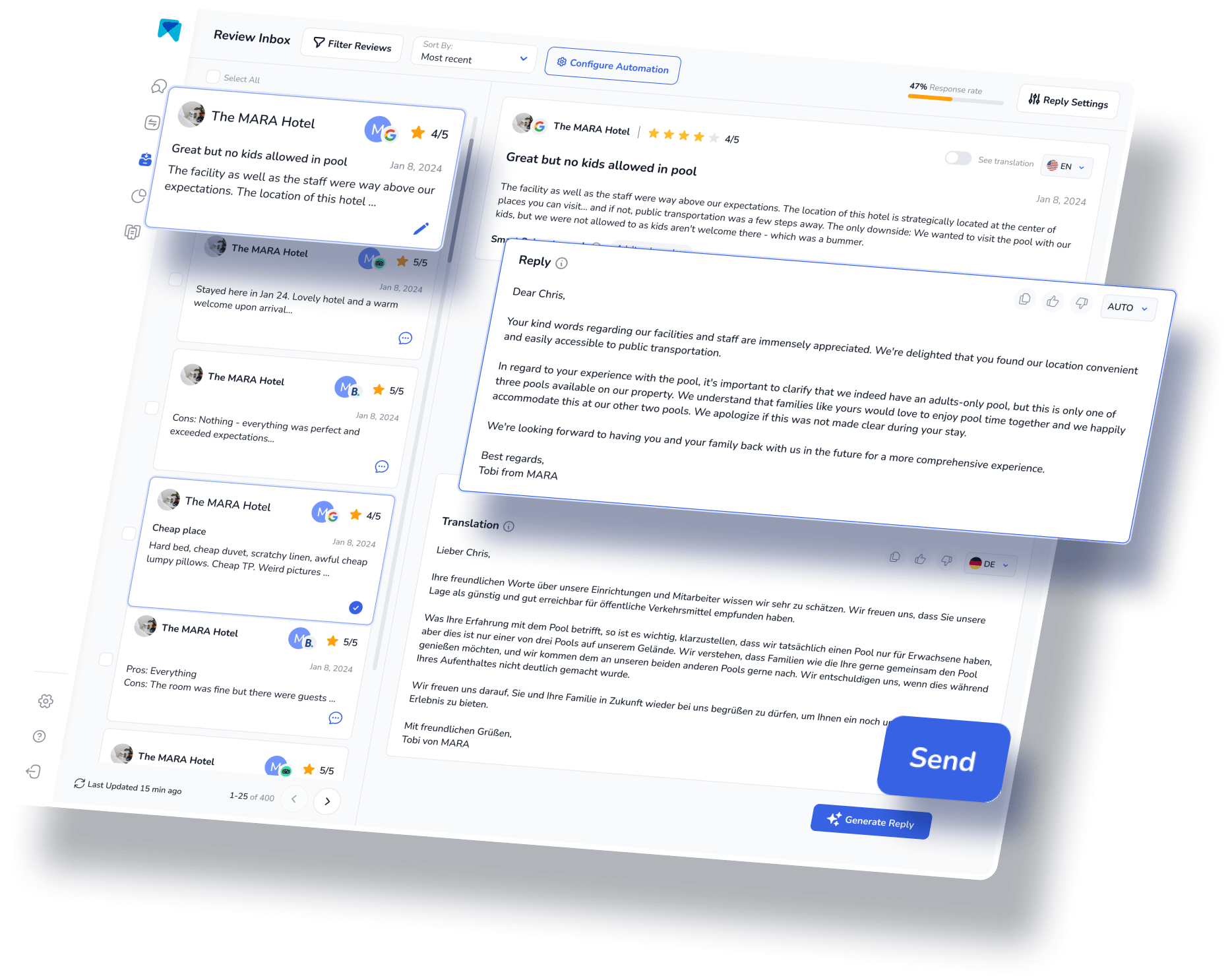
Extract customer insight from your reviews through Review Analytics
To help you understand and analyze the multitude of reviews, the Review Assistant also incorporates Review Analytics. This provides actionable, easy-to-understand insights tailored exclusively to your business. With MARA, you can quickly grasp the gist of all your reviews without needing to read each one. The analysis is so detailed that you can find out about specific issues like "not much variety in the menu" or "lack of vegan option.” These insights help optimize the guest experience without requiring you to be a data expert.
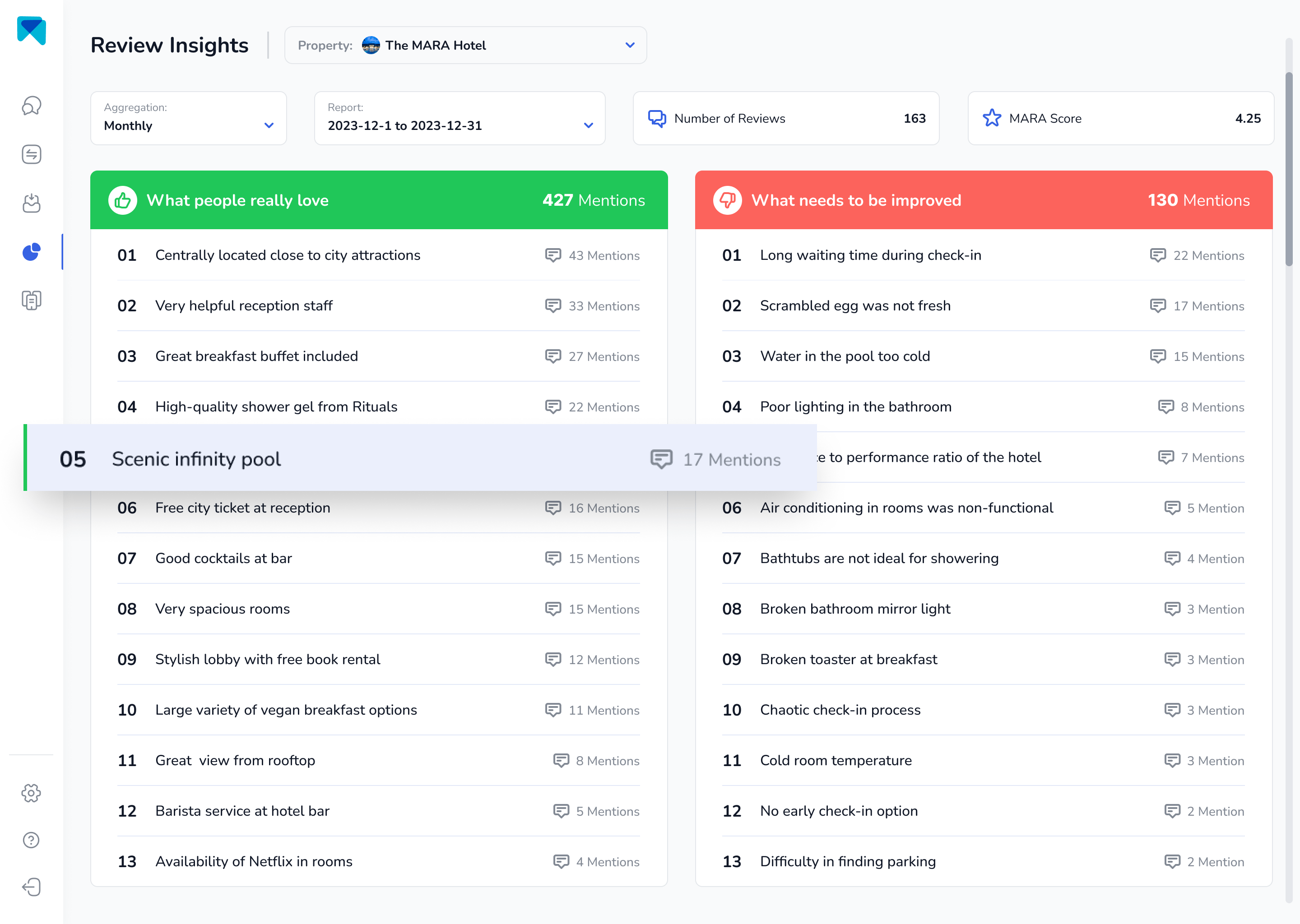
Multi-location and multi-listing management with Group Analytics
Additionally, our group analytics overview can provide a quick evaluation of the performance of each of your restaurant's location. Other than key metrics such as response rates, ratings, and the number of reviews, MARA also offers category scores based on advanced AI analytics. In the screenshot below, you can find an analysis for hotels with category scores for areas like Food & Beverage, Front Office, and Housekeeping. This analysis aids in swiftly identifying potential weaknesses, with a preview of detailed topics appearing when you hover over a category.

The most personalized response AI for your restaurant
MARA's AI isn't just about efficiency; it's about personalization too. The Brand Voice feature allows the AI to adapt to your tone, ensuring your responses sound authentically you. Plus, with Smart Snippets, you can "teach" the AI how to respond to recurring praises or complaints. Your AI then incorporates this information into its responses, but always with different words, providing more personalized, relevant replies.
Final Thought
Nowadays, restaurant owners can easily streamline their operations through numerous AI tools, such as MARA AI, which can help you effectively manage your online reputation.
This review response assistant has quickly become a game-changer for over 2000 customers. Its promising capacity to elevate your overall rating, amplify response rates, glean insights from customer feedback, and economize both time and money is the reason behind its growing popularity.
In conclusion, managing online reviews need not be an overwhelming task. With the appropriate software, not only can you streamline the process, but you can also personalize your responses and derive valuable insights from the reviews. So, why hesitate to give our AI Review Assistant, MARA, a try? It's completely free for testing , doesn't require a credit card, and can be fully operational in less than five minutes.
This article is part of our hero content “The Future of Hospitality Industry: Integrating AI into Hotels and Restaurants".
Frequently Asked Questions:
Using AI technologies can significantly enhance various aspects of the restaurant industry, including inventory management, food preparation, delivery services, and customer service. By integrating AI, restaurants like McDonald’s, Chipotle, and Domino’s can create efficient workflows that improve customer experience and potentially lead to revenue growth. AI-powered solutions streamline phone answering processes, optimize inventory, and enhance overall operational efficiency.
Using artificial intelligence and data science helps improve food demand forecasting in restaurants, leading to more controlled food production and reduced food waste. AI technologies, including machine learning algorithms, enable restaurants to accurately predict demand, ensuring that only the right amounts of food are produced. This is crucial for sustainability and helps reduce the environmental impact of food waste.
Machine learning (ML) algorithms and AI tools predict demand for food products, assisting restaurants in producing only the necessary amounts of food. This not only minimizes waste but also improves food serving and delivery methods. Major restaurant chains like White Castle and Del Taco are utilizing AI to enhance their food production processes and prevent unnecessary waste.
Yes, there are fully automated restaurants. For example, Pazziria at Beaubourg Paris, which opened on July 5th, 2021, is powered by Pazzi Robotics, a leader in food technology. This restaurant showcases how using AI and robotics can create a fully automated dining experience.
AI technologies play a crucial role in managing food delivery services efficiently. They help restaurants handle orders accurately, including the assignment of orders among locations, estimating preparation and delivery times, and ensuring precise order dispatch. By leveraging AI, restaurants can enhance their delivery operations, much like the AI-driven systems used by major chains such as McDonald’s and Chipotle.






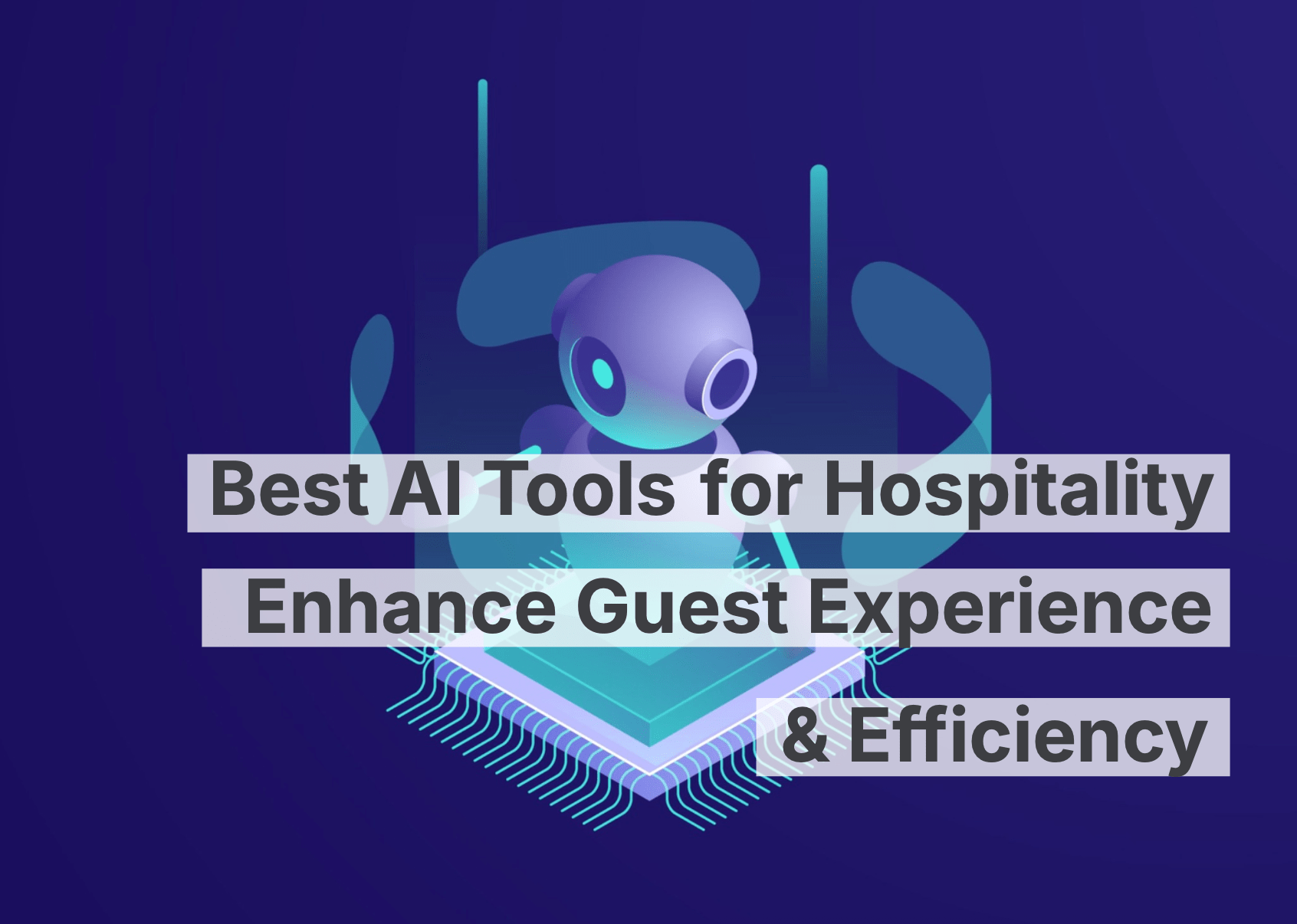
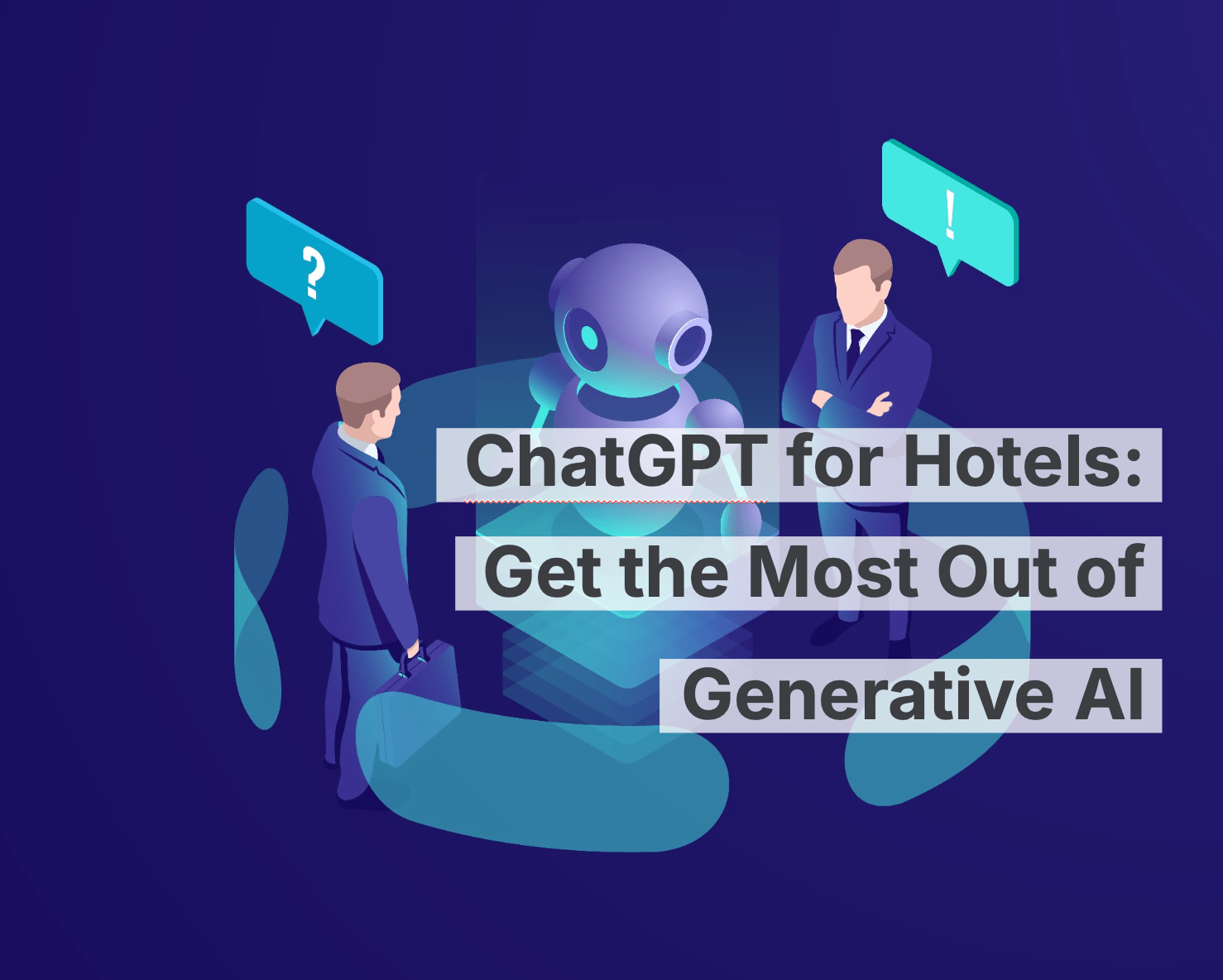

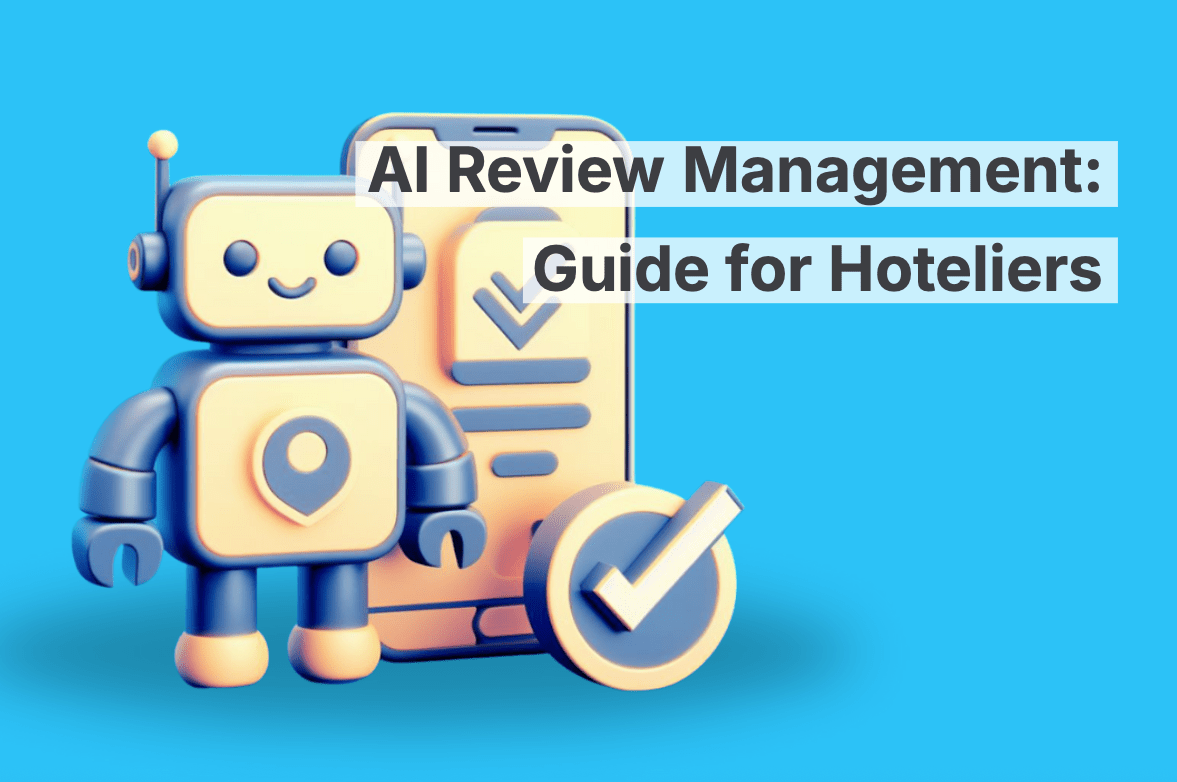








-min.avif)
